October 23, 2014 •
Pennsylvania Commission Approves Increase of Lobbyist Registration Fee
The Independent Regulatory Review Commission (IRRC) approved an increase of the state’s biennial lobbyist registration fee from $200 to $300. The additional revenue will help cover the Department of State’s costs of maintaining the lobbyist registration and disclosure database. The […]
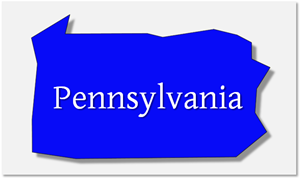 The Independent Regulatory Review Commission (IRRC) approved an increase of the state’s biennial lobbyist registration fee from $200 to $300. The additional revenue will help cover the Department of State’s costs of maintaining the lobbyist registration and disclosure database.
The Independent Regulatory Review Commission (IRRC) approved an increase of the state’s biennial lobbyist registration fee from $200 to $300. The additional revenue will help cover the Department of State’s costs of maintaining the lobbyist registration and disclosure database.
The Department of State unsuccessfully sought increases on two prior occasions, to $700 and $400 every two years, but the IRRC believed this latest proposal was more reasonable.
The Pennsylvania Office of the Attorney General must approve the committee’s decision before it can be implemented for the 2015-2016 legislative session.
October 16, 2014 •
Pay-to-Play Bill Awaiting Pennsylvania Governor’s Approval
The Pennsylvania House of Representatives approved a bill Wednesday to curtail pay-to-play politics in state contracts. House Bill 201 prohibits state employees from evaluating contract proposals submitted by companies they worked for during the previous two years. The legislation has […]
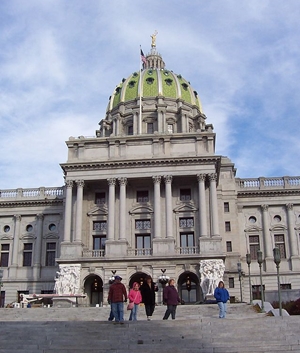 The Pennsylvania House of Representatives approved a bill Wednesday to curtail pay-to-play politics in state contracts.
The Pennsylvania House of Representatives approved a bill Wednesday to curtail pay-to-play politics in state contracts.
House Bill 201 prohibits state employees from evaluating contract proposals submitted by companies they worked for during the previous two years.
The legislation has been sent to Gov. Tom Corbett for his signature.
Photo of the Pennsylvania State Capitol by ThePlaz on Wikimedia Commons.
October 16, 2014 •
New Campaign Finance Rules in Philadelphia
The Philadelphia Board of Ethics approved amendments to the city’s campaign finance rules this week. Included in the amendments is a more expansive definition of third party support of a candidate. Campaign materials produced by a candidate and subsequently used […]
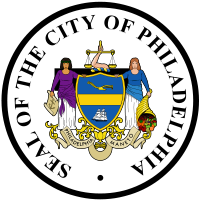 The Philadelphia Board of Ethics approved amendments to the city’s campaign finance rules this week. Included in the amendments is a more expansive definition of third party support of a candidate.
The Philadelphia Board of Ethics approved amendments to the city’s campaign finance rules this week. Included in the amendments is a more expansive definition of third party support of a candidate.
Campaign materials produced by a candidate and subsequently used by an individual or PAC, independent of the candidate, now constitutes an in-kind contribution subject to the city’s contribution limits. The new rule is intended to curb a growing trend among candidates of posting videos on the internet, allowing third parties to take the material and independently create political advertisements.
The board unanimously approved the changes in an expedited manner to ensure the new rules would cover the impending 2015 mayoral race.
September 19, 2014 •
Pennsylvania Regulatory Commission Rejects Lobbyist Fee Increase
The Independent Regulatory Review Commission (IRRC) rejected the Department of State’s proposed increase to the biennial lobbyist registration fee. The proposal called for an increase from $200 to $400 for lobbyists, lobbying firms, and principals. The Department of State believed […]
 The Independent Regulatory Review Commission (IRRC) rejected the Department of State’s proposed increase to the biennial lobbyist registration fee. The proposal called for an increase from $200 to $400 for lobbyists, lobbying firms, and principals.
The Independent Regulatory Review Commission (IRRC) rejected the Department of State’s proposed increase to the biennial lobbyist registration fee. The proposal called for an increase from $200 to $400 for lobbyists, lobbying firms, and principals.
The Department of State believed the higher fees were needed to offset increased costs associated with the lobbyist registration database and website. The IRRC disapproved the increase following testimony stating it would be too burdensome on smaller companies and the general public, creating a disincentive to engaging in the lawmaking process.
August 14, 2014 •
Federal Judge Strikes Down Pennsylvania Campaign Finance Law
A federal judge in Pennsylvania struck down a state campaign finance law restricting the amount corporations and labor unions could donate to expenditure-only political committees. U.S. District Judge William W. Caldwell found Pennsylvania Election Code Section 3253(a) violates the First […]
 A federal judge in Pennsylvania struck down a state campaign finance law restricting the amount corporations and labor unions could donate to expenditure-only political committees. U.S. District Judge William W. Caldwell found Pennsylvania Election Code Section 3253(a) violates the First Amendment by limiting the amount a corporation or labor group can donate to political committees only making independent expenditures.
A federal judge in Pennsylvania struck down a state campaign finance law restricting the amount corporations and labor unions could donate to expenditure-only political committees. U.S. District Judge William W. Caldwell found Pennsylvania Election Code Section 3253(a) violates the First Amendment by limiting the amount a corporation or labor group can donate to political committees only making independent expenditures.
In his decision, Judge Caldwell cites to the Supreme Court decision Citizens United v. Federal Election Commission declaring limitations on independent expenditures made by corporations and labor unions restrict free speech.
The case, in the U.S. District Court for the Middle District of Pennsylvania, is General Majority PAC v. Aichele et al.
Counsel for the Kentucky Legislative Ethics Commission John Schaaf testified before the Pennsylvania Senate State Government Committee on Kentucky’s strict ethics laws. Pennsylvania has one of the most lax ethics laws in the country, permitting officials to receive gifts in […]
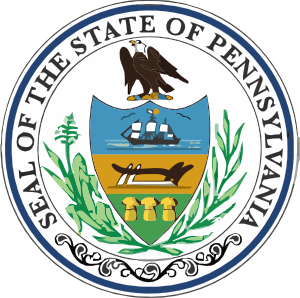
Counsel for the Kentucky Legislative Ethics Commission John Schaaf testified before the Pennsylvania Senate State Government Committee on Kentucky’s strict ethics laws. Pennsylvania has one of the most lax ethics laws in the country, permitting officials to receive gifts in any amount, while Kentucky recently made its own strict law even more stringent by prohibiting all lobbyist gifts. Pennsylvania’s ethics laws have been under scrutiny after the recent allegations of legislators accepting cash payments from a lobbyist as part of a sting operation.
Schaaf testified about prior changes to Kentucky’s law enacted in a special session in 1993, in response to several legislators charged with ethics violations by the FBI. Schaaf stressed the importance of getting a law on the books; once enacted, it is difficult to change.
However, Kentucky’s ethics law only covers legislators and legislative candidates, and Pennsylvania Senator Lloyd Smucker, sponsor of a bill banning cash gifts, said broadening such a ban to other government employees makes the legislation more complex and may make it difficult to win support. Still, Pennsylvania’s lawmakers were interested in Kentucky’s approach to ethics, particularly the idea of an independent ethics commission available to answer questions from lawmakers and lobbyists.
April 2, 2014 •
Pennsylvania House Committee Bans Cash Gifts
The Pennsylvania House Bipartisan Management Committee has adopted an ethics rule banning cash gifts. The rule was imposed in response to the highly publicized sting operation involving four House members who allegedly took cash from a lobbyist. The rule permits […]

The Pennsylvania House Bipartisan Management Committee has adopted an ethics rule banning cash gifts.
The rule was imposed in response to the highly publicized sting operation involving four House members who allegedly took cash from a lobbyist.
The rule permits house members to receive cash from family members and non-lobbyist friends.
Photo of the Pennsylvania State Capitol courtesy of Michael180 on Wikimedia Commons.
March 21, 2014 •
Philadelphia Adopts Dollar Limit on Gifts
Philadelphia passed ethics legislation providing a dollar limit on gifts during its March 20 meeting. The legislation prohibits all city officers and employees from receiving gifts worth more than $99 in a calendar year from any donor, and bans all […]

Philadelphia passed ethics legislation providing a dollar limit on gifts during its March 20 meeting. The legislation prohibits all city officers and employees from receiving gifts worth more than $99 in a calendar year from any donor, and bans all cash gifts.
A number of exceptions are provided, including food and beverage at meetings and non-ticketed receptions.
The bill is expected to be signed by Mayor Nutter. Board of Ethics Executive Director Shane Creamer said the Board will begin working on new gift regulations once the bill is signed.
March 4, 2014 •
Super PAC Sues Over Pennsylvania Corporate Contribution Ban
A group billing itself as “the first nationwide super PAC focused on electing Democratic state legislators and other political leaders to build middle-class economic security” is challenging Pennsylvania’s ban on corporate and labor union contributions. General Majority PAC filed suit […]

A group billing itself as “the first nationwide super PAC focused on electing Democratic state legislators and other political leaders to build middle-class economic security” is challenging Pennsylvania’s ban on corporate and labor union contributions. General Majority PAC filed suit in the U.S. District Court for the Middle District of Pennsylvania in late February, alleging the prohibition on PACs from receiving corporate and labor union contributions to make independent expenditures chills its free speech rights and is contrary to the U.S. Supreme Court’s Citizens United ruling.
Given the short amount of time until Pennsylvania’s primary election, the group also requested an injunction to immediately suspend the law so it may begin operating in Pennsylvania as soon as possible. General Majority made clear it intends to register as a Pennsylvania PAC upon reaching the state’s registration threshold, and will not coordinate with any state candidates or party committees.
February 25, 2014 •
Philadelphia Gift Ordinance Advances Out of Committee
A proposed ordinance setting a dollar limit for gifts has advanced out of committee. On February 24, the City Council’s Committee on Law and Government voted to submit the bill for Council action. The proposed ordinance prohibits gifts exceeding $99 […]

A proposed ordinance setting a dollar limit for gifts has advanced out of committee. On February 24, the City Council’s Committee on Law and Government voted to submit the bill for Council action.
The proposed ordinance prohibits gifts exceeding $99 per calendar year to any city officials or employees, and bans all cash gifts.
The ordinance could pass as early as next week.
January 31, 2014 •
Two New Proposals May Clarify Philadelphia Gift Law
Two proposals in Philadelphia could finally establish a dollar limit on gifts to city employees. The city’s Board of Ethics again revised its proposed gift limit to $50 with an outright ban on cash gifts. The initial proposals allowed for […]

Two proposals in Philadelphia could finally establish a dollar limit on gifts to city employees. The city’s Board of Ethics again revised its proposed gift limit to $50 with an outright ban on cash gifts.
The initial proposals allowed for some measure of cash gifts based on interpretation of city law allowing some cash gifts, enraging ethics watchdogs. After a reinterpretation by the city law department allowing the Board to ban cash gifts, the ban was included in the latest proposal. A final vote on the gift regulation is expected at the Board’s February 19 meeting.
The Philadelphia City Council is also considering a gift measure, allowing city officials and employees to accept gifts up to $99. The Council’s proposal also bans all cash gifts.
If the Council passes the gift law, the Board of Ethics will need to restart work on its gift regulation, as it can only pass regulations interpreting city law and may not impose a stricter limit than established by statute. Either way, the city appears to be on track in providing much needed clarification of its gift law.
December 20, 2013 •
Philadelphia Board of Ethics Struggles to Enact Gift Regulations
The Philadelphia Board of Ethics staff has released a revised gift proposal following claims its initial proposed limits were too lax. The new suggested limits are a ban on gifts of more than $100, with a limit of $25 on […]
 The Philadelphia Board of Ethics staff has released a revised gift proposal following claims its initial proposed limits were too lax. The new suggested limits are a ban on gifts of more than $100, with a limit of $25 on cash gifts, per calendar year from any source not a family member of the recipient. The initial limits proposed were $200 per year, with a cap of $50 for cash gifts, resulting in outcry from watchdogs.
The Philadelphia Board of Ethics staff has released a revised gift proposal following claims its initial proposed limits were too lax. The new suggested limits are a ban on gifts of more than $100, with a limit of $25 on cash gifts, per calendar year from any source not a family member of the recipient. The initial limits proposed were $200 per year, with a cap of $50 for cash gifts, resulting in outcry from watchdogs.
The new proposed limits were greeted with skepticism, however, because the provision allowing for cash gifts remained. Executive Director Shane Creamer insisted the Board cannot ban cash gifts altogether because the city code permits cash gifts, prompting the Board to decide on formally requesting the City Council to consider amending the code.
The suggested limits could drop yet again before the Board votes, as a number of Board members suggested a $50 annual limit was preferable. The Board could potentially vote on the rules at its January meeting.
November 7, 2013 •
Pennsylvania General Assembly Debuts New Website
The Pennsylvania General Assembly has launched a new and improved website. The new site makes it easier to track general assembly activities, with scheduled committee meetings listed right on the home page. The site also includes an improved legislative search […]
The Pennsylvania General Assembly has launched a new and improved website. The new site makes it easier to track general assembly activities, with scheduled committee meetings listed right on the home page. The site also includes an improved legislative search feature, with a new email tracking system allowing users to sign up for email alerts when legislation of interest changes status.
Senate Majority Leader Dominic Pileggi said the change was designed to bring greater transparency to the General Assembly’s activities and make it easier for citizens to track legislative activities.
The Pennsylvania General Assembly website can be found at www.legis.state.pa.us.
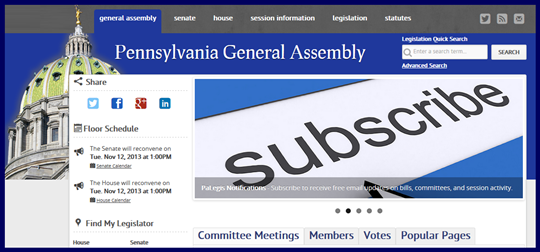
October 22, 2013 •
Philadelphia Board of Ethics Proposes Gift Limits
Ethics watchdogs say limits are too low
 The city Board of Ethics has proposed new gift regulations designed to clarify what is and is not permitted under the city code. The proposed limits would allow city officers and employees to accept gifts of up to $200 per year from a single source, including cash gifts up to $50. Currently, only gifts of substantial economic value given with the expectation of influencing the public official or employee are prohibited.
The city Board of Ethics has proposed new gift regulations designed to clarify what is and is not permitted under the city code. The proposed limits would allow city officers and employees to accept gifts of up to $200 per year from a single source, including cash gifts up to $50. Currently, only gifts of substantial economic value given with the expectation of influencing the public official or employee are prohibited.
City watchdogs have criticized the proposed limits as being too lenient, but ethics board member Sanjuanita Gonzales suggested those limits could be subject to change after public input.
A hearing on the proposed regulations is scheduled for November 20.
State and Federal Communications, Inc. provides research and consulting services for government relations professionals on lobbying laws, procurement lobbying laws, political contribution laws in the United States and Canada. Learn more by visiting stateandfed.com.

